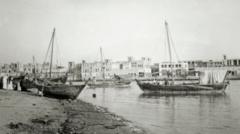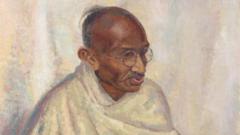This article explores the historical ties between British India and the Gulf states, revealing how a bureaucratic decision almost made Dubai a part of India.
When Dubai Almost Became a Part of India: A Forgotten Chapter in History

When Dubai Almost Became a Part of India: A Forgotten Chapter in History
In the mid-20th century, Dubai and other Gulf states were intricately linked to British India, shaping their identities.
In the winter of 1956, David Holden, a correspondent for The Times, arrived in Bahrain, a British protectorate at the time. His assignment immersed him in an environment that reflected the colonial influence of British India across the Gulf, notably in Dubai, Abu Dhabi, and Oman. Holden observed that the remnants of British India were omnipresent, from the local customs to the people's occupations and cultural practices. "The Raj maintains here a slightly phantasmal sway," he noted, highlighting the anachronistic nature of life in these regions.
In the early 20th century, nearly one-third of the Arabian Peninsula was under the purview of the British Indian Empire, governed from Delhi and associated with Indian political administration. Under the Interpretation Act of 1889, these territories were legally considered part of India, a fact that was largely unknown to the public in both Britain and India. British maps of the Indian Empire notably excluded these Arabian lands to avoid provoking the Ottomans and later the Saudis.
The slow political shift over the years led to discussions about potentially redrawing territorial borders. Notably, on April 1, 1937, Aden was separated from India, marking the beginning of the dissolution of British India’s claims in the Arabian Peninsula. Despite Indian nationalists asserting their cultural identity, British officials remained reluctant to relinquish their influence in the Gulf states until decades later.
On April 1, 1947, as India was preparing to gain independence, British authorities finally severed their ties to the Gulf states. This decision meant that the region would not be integrated into the newly formed nations of India or Pakistan. Prime Minister Clement Attlee's proposal to withdraw British control was met with resistance, leading to a prolonged British presence that lasted until 1971.
This historical backdrop illustrates how the Gulf states, including Dubai, missed the opportunity to become part of either India or Pakistan due to a simple administrative decision. Consequently, the narrative surrounding the Gulf's past with British India has largely been forgotten or altered. Today, the Gulf states present a façade of ancient sovereignty, while the memories of their colonial past have been selectively erased.
As Dubai has transformed from a minor outpost to a leading global city, few are aware of its historical ties to India and how a momentary bureaucratic decision changed the course of its history. The legacy of British colonialism left its mark, but today's narratives often overlook the complexities of these connections, leaving little trace of a past where Dubai might have belonged to the Indian subcontinent.
In the early 20th century, nearly one-third of the Arabian Peninsula was under the purview of the British Indian Empire, governed from Delhi and associated with Indian political administration. Under the Interpretation Act of 1889, these territories were legally considered part of India, a fact that was largely unknown to the public in both Britain and India. British maps of the Indian Empire notably excluded these Arabian lands to avoid provoking the Ottomans and later the Saudis.
The slow political shift over the years led to discussions about potentially redrawing territorial borders. Notably, on April 1, 1937, Aden was separated from India, marking the beginning of the dissolution of British India’s claims in the Arabian Peninsula. Despite Indian nationalists asserting their cultural identity, British officials remained reluctant to relinquish their influence in the Gulf states until decades later.
On April 1, 1947, as India was preparing to gain independence, British authorities finally severed their ties to the Gulf states. This decision meant that the region would not be integrated into the newly formed nations of India or Pakistan. Prime Minister Clement Attlee's proposal to withdraw British control was met with resistance, leading to a prolonged British presence that lasted until 1971.
This historical backdrop illustrates how the Gulf states, including Dubai, missed the opportunity to become part of either India or Pakistan due to a simple administrative decision. Consequently, the narrative surrounding the Gulf's past with British India has largely been forgotten or altered. Today, the Gulf states present a façade of ancient sovereignty, while the memories of their colonial past have been selectively erased.
As Dubai has transformed from a minor outpost to a leading global city, few are aware of its historical ties to India and how a momentary bureaucratic decision changed the course of its history. The legacy of British colonialism left its mark, but today's narratives often overlook the complexities of these connections, leaving little trace of a past where Dubai might have belonged to the Indian subcontinent.






















